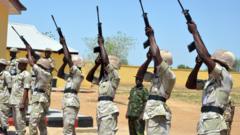In a recent military statement, Nigeria's armed forces reported the successful execution of air strikes near its northeastern border with Cameroon, which resulted in the deaths of 35 jihadists. These operations were undertaken across four distinct areas to prevent planned assaults on ground troops. Nigeria is currently grappling with numerous violent conflicts that include jihadist insurgencies, criminal gangs, sectarian unrest, and rampant kidnappings for ransom, all of which have plagued the country for over a decade.
A group of influential Nigerians, encompassing former government officials, business leaders, and civil society representatives, expressed alarm over the intensifying violence in the country, likening the situation in certain regions to "war-time levels of slaughter" despite the government’s assertion of peace. They referenced a May report from Amnesty International that documented over 10,000 fatalities since President Bola Tinubu's administration began two years ago. This coalition is advocating for the creation of a Presidential Task Force to address the multitude of conflicts, including the resurgence of the Boko Haram militant group and its offshoot, Islamic State West Africa Province (ISWAP).
In the past eight months, the military has claimed responsibility for the deaths of nearly 600 militants in the northeastern regions. The Nigerian Air Force (NAF) has pledged to continue its aerial support for troops engaging jihadist strongholds. According to United Nations assessments, the ongoing conflict has resulted in more than 35,000 deaths and displaced over two million people across the nation.
Furthermore, the United States State Department recently authorized a sale of weapons worth $346 million to assist Nigeria in combatting the escalating violence. The Institute for Security Studies noted at least 15 jihadist attacks have occurred this year along Nigeria's borders with Cameroon and Niger. These insurgents have employed modified commercial drones to target military bases, complicating the military's ability to respond effectively.
Alongside operations against jihadist groups, the military has also targeted "bandits," a term used for criminal gangs in Nigeria. An air strike in Katsina state resulted in the rescue of 76 kidnapping victims, including women and children. However, the efforts came at a tragic cost, as a child reportedly lost their life during the rescue operation. The recent violence in the village of Unguwan Mantau, where gunmen attacked a mosque and surrounding homes, led to at least 50 deaths and the kidnapping of about 60 individuals, demonstrating the harsh realities faced by Nigerian communities in conflict-ridden areas such as Katsina and Zamfara states, which have been hit hardest by gangster-related violence.
For more updates on Nigeria and its ongoing struggles, visit bbcaafrica.com, and follow them on social media platforms.
A group of influential Nigerians, encompassing former government officials, business leaders, and civil society representatives, expressed alarm over the intensifying violence in the country, likening the situation in certain regions to "war-time levels of slaughter" despite the government’s assertion of peace. They referenced a May report from Amnesty International that documented over 10,000 fatalities since President Bola Tinubu's administration began two years ago. This coalition is advocating for the creation of a Presidential Task Force to address the multitude of conflicts, including the resurgence of the Boko Haram militant group and its offshoot, Islamic State West Africa Province (ISWAP).
In the past eight months, the military has claimed responsibility for the deaths of nearly 600 militants in the northeastern regions. The Nigerian Air Force (NAF) has pledged to continue its aerial support for troops engaging jihadist strongholds. According to United Nations assessments, the ongoing conflict has resulted in more than 35,000 deaths and displaced over two million people across the nation.
Furthermore, the United States State Department recently authorized a sale of weapons worth $346 million to assist Nigeria in combatting the escalating violence. The Institute for Security Studies noted at least 15 jihadist attacks have occurred this year along Nigeria's borders with Cameroon and Niger. These insurgents have employed modified commercial drones to target military bases, complicating the military's ability to respond effectively.
Alongside operations against jihadist groups, the military has also targeted "bandits," a term used for criminal gangs in Nigeria. An air strike in Katsina state resulted in the rescue of 76 kidnapping victims, including women and children. However, the efforts came at a tragic cost, as a child reportedly lost their life during the rescue operation. The recent violence in the village of Unguwan Mantau, where gunmen attacked a mosque and surrounding homes, led to at least 50 deaths and the kidnapping of about 60 individuals, demonstrating the harsh realities faced by Nigerian communities in conflict-ridden areas such as Katsina and Zamfara states, which have been hit hardest by gangster-related violence.
For more updates on Nigeria and its ongoing struggles, visit bbcaafrica.com, and follow them on social media platforms.



















